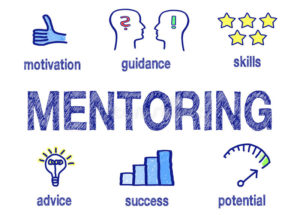What is mentoring?
“Modern mentoring is to intentionally pair an experienced person with a less experienced person, in a very high potential of personal and professional development, with the goal to support the growth of both parties” (Murray, Clawson)
“to whom offer positive role model recognized by everybody” (Kram)
“in a specific organized context for a determined period of time’”
“in a mutual learning trough emotions and shared and recognized values”
“in a creation of mutual trust relationship with the goal to create ‘sense making’ of the mentee action”
SIM – Italian School of Mentoring

Mentoring is an instrument with a broad variety of implementations in the society. It is a form of coaching and networking and makes an essential contribution to the growth and success of young people. Mentoring provides recognition and acknowledgment. It provides role modelling, stimulus and personal attention to the participants. They achieve their goals faster when they feel supported and encouraged by someone who has travelled a similar path before. Young people make use of the success strategies of the mentor. The strength of mentoring lies in the fact that all parties benefit from it. The mentee gains confidence and has the feeling of not standing alone. The mentor develops skills as a leader, trainer and coach.
Mentoring brings an additional encouragement for participating youth to realize their career ambitions and life aspirations. If students lack a positive role model and personal attention in their existing private network, a mentor can help with dilemmas in the field of personal leadership, education or career. Youth mentoring relationships have significant potential for promoting positive youth development with regards to social competences towards acquisition of necessarily experience with employers to ensure the transition of youth students to the labour market.
The benefits derived from such relationships depend considerably on the length and quality of the bonds that are created between mentors and youth. Although some attention has been paid to youth’s experience of relationship quality, few studies have focused on mentors’ experience of relationship quality and almost none are presenting approach or a tool for validation of this non-formal and informal learning/experience.

About the VM-Pro project
During the project activities, the mentees with disabilities will gain experience in team building, entrepreneurship possibilities and experience in a social and working life. Giving them a fair chance on the job market will make them less dependent and will boost their self-confidence, self-esteem, motivation towards the effectiveness of the learning and also labour market pathway for further growing. Instead of marginalizing a large group of people and ignoring their potential, the project partnership will increase level of integration of youth with disabilities into the labour market and society. By this way promoting empowerment, participation and the active citizenship of young people will be gained from the project outputs and results.
The VM-PRO project will also stimulate the horizontal priority for social inclusion by strengthening the integration at local level of students/youth with disabilities and will demonstrate its full potential at national level. By introducing mentoring scheme and validation mechanisms as a ‘second chance’ reintegration program to young people (dropping out of education aged between 16 and 24) and changing the attitudes of youth workers, teachers, psychologists, social workers (as mentors), the project will help to relieve the community of this social burden.
Mentoring programs hold great promise for fostering competency in disadvantaged youth. But there are no tools/initiatives available that could measure the achievements and expected impact. The presented project will develop and validate a tool to assess youth mentees’ perceptions of their relationships with their mentors and to investigate the relationship between this alliance and youth competences.
The project is also highlighting its appropriateness towards the school education priority “Supporting schools to tackle early school leaving and disadvantage” – mentoring is particularly effective in supporting students with disabilities to go back to education (either mainstream or VET) in order to receive further support and the be prepared while facing challenges in the labour market and its proper validation provides important benefits to those participants:
• Mentees should be able to have their learning achievements and experiences recognized;
• All involved invest substantial time and effort: validation offers confidence in the program’s efficiency, organization and overall quality;
• Similarly employers and training providers will have confidence in judging the ability of their recruits if the mentoring schemes through which they have learned have been properly validated.
Through offering tool for systematic validation of the outcomes from the mentoring the youth with disabilities will benefits from:
• Increased education graduation rates
• Lower education/school dropout rates
• Healthier relationships and lifestyle choices
• Better attitude about the education with regards to its effectiveness towards employment
• Smooth transition from the education to the labour market by gaining practical experience at employers’ premises
• Enhanced self-esteem and self-confidence Improved behaviour, both at educational institution, at the job place and at home
• Stronger relationships with teachers, psychologists, youth and social workers which will lead to improved civic and interpersonal skills
• Decreased likelihood of initiating drug and alcohol use
• Mentoring can help youth as they go through challenging life transitions, including dealing with stressful changes at home or transitioning to adulthood.
• Better society position and participation as active citizens.
